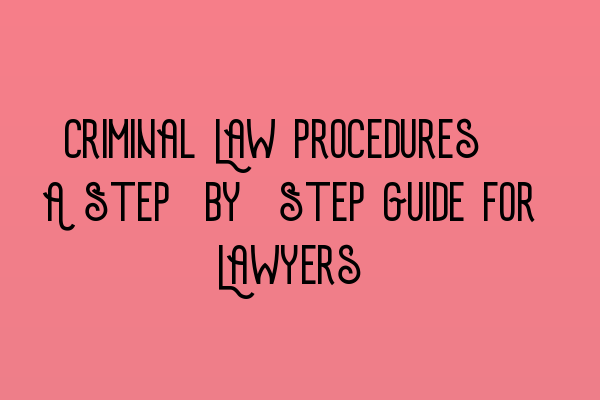Criminal Law Procedures: A Step-by-Step Guide for Lawyers
If you are a lawyer specializing in criminal law, it is essential to have a deep understanding of the criminal law procedures. These procedures outline the legal framework within which criminal cases are dealt with in the UK. Familiarizing yourself with the step-by-step process will not only enhance your legal skills but also ensure that you provide the best possible representation for your clients.
In this comprehensive guide, we will walk you through the various stages of criminal law procedures, providing insights and tips along the way. Let’s dive right in!
1. Investigation and Arrest
Every criminal case starts with an investigation by law enforcement agencies. This stage involves gathering evidence, interviewing witnesses, and identifying potential suspects. Once the investigation reaches a certain point, the authorities may make an arrest based on the evidence collected.
It is crucial for lawyers to understand the legal requirements for a valid arrest, such as reasonable suspicion or probable cause. Having a solid grasp of these concepts will enable you to challenge any unlawful arrests and protect your clients’ rights.
2. Charging and Bail
After the arrest, the authorities will decide whether to charge the suspect with a criminal offense. This decision is often based on the evidence gathered during the investigation. If charged, the suspect will be brought before a court, where bail may be considered. Bail allows the suspect to be released from custody while awaiting trial.
As a lawyer, it is crucial to be well-versed in the criteria for granting or denying bail. Your expertise in this area will enable you to present compelling arguments for bail, ensuring that your clients’ interests are protected to the fullest extent possible.
3. Plea Bargaining and Pre-trial Proceedings
In some cases, the prosecution and defense may engage in plea bargaining, where the defendant agrees to plead guilty in exchange for a reduced sentence or lesser charges. This stage often involves negotiations between the parties and requires strategic thinking and negotiation skills on the part of the defense lawyer.
Pre-trial proceedings, such as case management hearings and disclosure of evidence, also take place during this stage. It is essential for lawyers to actively participate in these proceedings, ensuring that all relevant information is disclosed and that the case is effectively prepared for trial.
4. Trial
The trial is the central event in any criminal case. It is where the prosecution presents its case, and the defense has the opportunity to challenge the evidence and present its own case. As a lawyer, effective trial advocacy skills are paramount to secure the best possible outcome for your clients.
During the trial, you will have the opportunity to cross-examine witnesses, present evidence, and make persuasive legal arguments. It is crucial to adhere to the rules of evidence and procedure, as any missteps can have significant consequences for your client’s case.
5. Verdict and Sentencing
Once the trial concludes, the jury or judge will deliver a verdict. If the defendant is found guilty, the court will proceed to the sentencing stage. Sentencing involves determining the appropriate punishment for the convicted individual, taking into account various factors such as the severity of the offense, the defendant’s criminal history, and any mitigating or aggravating circumstances.
During the sentencing stage, lawyers can advocate for their clients, presenting mitigating factors that may lead to a more favorable sentence. It is essential to have a comprehensive understanding of the sentencing guidelines and relevant case law to effectively represent your clients’ interests.
Conclusion
In summary, a strong grasp of criminal law procedures is essential for lawyers specializing in criminal law. By understanding each step of the process and staying up to date with legal developments, you can provide effective legal representation for your clients and navigate the complexities of the criminal justice system with confidence.
If you are looking for legal representation for Delaware LLCs in the UK, make sure to check out our related article: Legal Representation for Delaware LLCs in the UK: Expert Advice.
For more information on ethical business practices, take a look at our article: Ensuring Ethical Business Practices: Delaware’s Code of Conduct.
To overcome legal challenges for UK businesses in the US, we recommend reading: Legal Challenges for UK Businesses in the U.S.: Strategies for Overcoming Hurdles and Legal Challenges for UK Businesses in the U.S.: Strategies for Overcoming Hurdles.
If you are an aspiring solicitor preparing for the SQE exams, check out our article on essential study materials: SQE Exam Prep: Essential Study Materials for Aspiring Solicitors.
We hope this guide has provided you with valuable insights into the criminal law procedures. As a lawyer, your knowledge and expertise in this area will be crucial in ensuring justice for your clients and upholding the rule of law.
